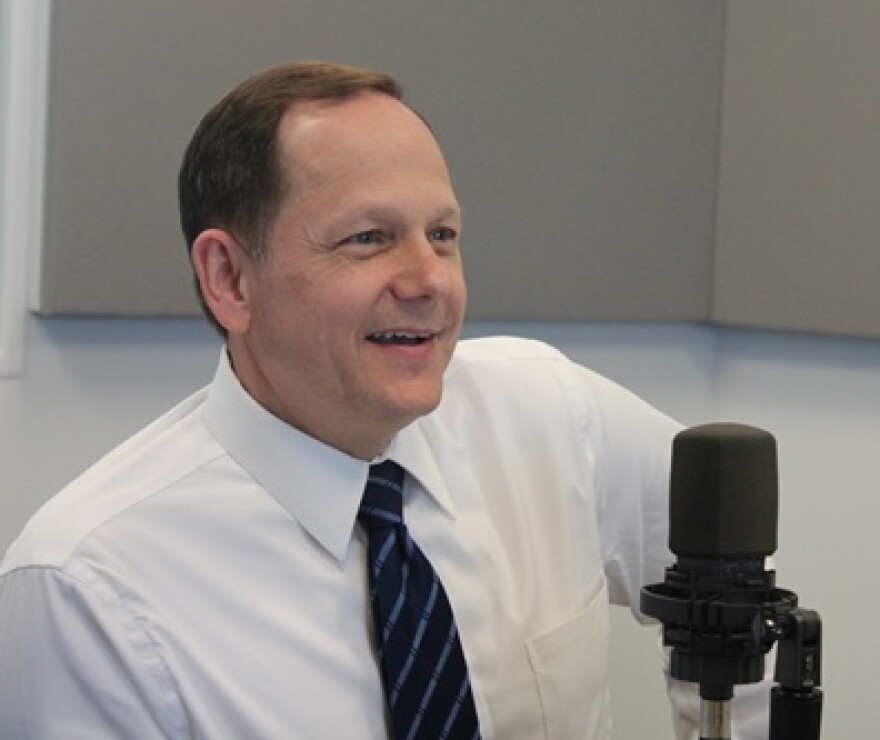There has been much discussion about ways to improve safety in St. Louis. As of June 10, St. Louis police have recorded nearly 80 homicides in the city, close to half of the total number of homicides for the entire year of 2014. Police department statistics show that just 24 of them are considered closed, meaning an arrest has been made.
On Wednesday, Mayor Francis Slay joined Marsh to discuss more about violence in the city and the strategies his office is taking to improve conditions. In addition, Slay provided insight into his decision to support a $15 minimum wage increase and his support for a new downtown football stadium.
“We’ve seen an increase in violent crime compared to last year.”
While there may be no straightforward answer as to why violent crime is on the rise, Slay explained that one factor is that many more people are using guns to settle their disputes.
“We have more guns out on our streets than we’ve ever seen before,” he said. “The police have a huge challenge before them.”
There are three essential approaches Slay wants to address in order to produce effective results:
- Finding and arresting criminals who “terrorize” neighborhoods.
- Encouraging courts to become tougher on sentencing and preventing the “revolving door of the system,” where repeat offenders are often back on the streets.
- Cater to the socio economic conditions by creating social programs to bring jobs and better schools to the city.
Slay explained that his office is working on long-term initiatives to create better socio economic environments so that “people have opportunities to live a life without committing crimes.”
Although policing is an important aspect of curbing crime, recently Ald. Antonio French attributed the lack of solved crimes to a deteriorating relationship between the police and the community, a decline he said is driven by police shootings in the city and elsewhere. He has proposed a special aldermanic committee that will review all police shootings between January 2014 and this December, and recommend changes to police policy and state and city law. His proposal had a hearing on Wednesday.
Slay called French’s efforts nothing more than political grandstanding. The St. Louis Metropolitan Police Department already does a good job investigating officer-involved shootings, he said, and a newly-approved Civilian Oversight Board will make those reviews even better.
“It seems like an effort to, I think, unduly politicize what I think is a very serious process that we ought to all be getting behind,” Slay said.
French denied that his proposed committee is meant to be a witch hunt. Members wouldn’t duplicate the efforts of the circuit attorney and internal affairs, he said – they would be evaluating policy.
French’s proposal still needs two more votes to become law, but does not require the mayor’s signature.
“We’re working on all these different fronts,” Slay said, “but I can tell you that the most frustrating is on the ground. Seeing some of these individuals who are [repeat] offenders, yet are right back on the street victimizing people time and time again.”
Minimum Wage Increase — “We’re taking a very responsible and deliberate approach”
Recently, a bill was introduced and is currently before the Board of Aldermen that would allow local governments to establish a minimum wage. The Board of Aldermen is considering the bill and a decision must be completed by August 28. The bill, Slay said, would gradually increase the minimum wage to $15 an hour over a period of five years.
“The minimum wage today in real dollars is about one-third of what it was in the 1960s when it was at its peak,” he said. “We have, as a country, already decided that a minimum wage [increase] is necessary, but the question with this effort is what the dollar amount should be and over what period of time, and when should it take effect.”
Slay mentioned that the bill will be publicly vetted, and that businesses will have the opportunity to attend hearings on the topic. There are some suggestions that businesses might leave the area if the minimum wage increases, however Slay explained that it’s not likely to happen. “There have been studies done of cities that had minimum wages higher than adjoining counties or states,” he said, “but there’s really no evidence or data that there would be higher unemployment or businesses fleeing the jurisdiction because of a higher minimum wage.”
“There will be no stadium built unless we have a solid NFL commitment to a team.”
Although Slay has expressed support for a new football stadium, he assures that without commitment from a NFL team, there will be no new stadium built. Current plans show a new stadium would require nearly a half billion dollars of private money. “If that [money] isn’t there, the city is not going to do what was done 20 or 25 years ago, when they built a stadium before there was a team,” he said.
If approval for a new stadium goes through, some property owners will lose buildings, particularly notable historic buildings near the riverfront. Still, Slay said that he feels the location is most suitable for construction.
“I think [the riverfront] is the best place to put the stadium,” Slay said. “There have been no [other] interests to do development in the area and it has been sitting there blighted for a long time. That area is prime for development.”
Listen to the audio to hear more topics the mayor discussed, including the decision to move forward with building the National Geospatial-Intelligence Agency in north St. Louis, the importance of the city’s earnings tax and his decision to run for an unprecedented fifth term.
St. Louis on the Air discusses issues and concerns facing the St. Louis area. The show is produced by Mary Edwards and Alex Heuer and hosted by veteran journalist Don Marsh. Follow us on Twitter: @STLonAir.






